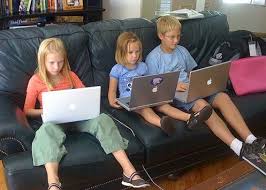Read the original article in ‘Family Traveller’
As a former teacher, mother of four and working as a parent educator for the last 16 years, the whole issue of managing screen time is one I get asked about an awful lot.
Skiing over February half term was far and away one of the best bonding family holidays I can remember. In large part due to the lack of screens. We were out with the kids (aged seven–15) on the mountains all day and had extremely limited Wi-Fi back in the chalet. We came home incredibly refreshed and connected as a family.
There is no point totally banning screens or demonising them as they have become such an essential part of our everyday lives. However, it is a parent’s responsibility to teach children to manage screen use responsibly and learn self-regulation.
Top tips for a successful digital detox:
1. Agree screen rules/limits before the holiday
Rules should include how long everyone can spend on screens, where and when they can be used, what for etc. Listen to how your child feels, what they want and explain your views and concerns. Reach a compromise and put the rules in writing. Clear rules are empowering as children then know what to do and ultimately develop good habits.
2. Establish rewards and consequences for following the rules
At the same time as creating the rules, you also need to agree on the reward for keeping to them and the consequence for not. Ask your children for ideas as they may come up with suggestions you would never have thought of.

How about making the car a screen-free zone?
3. Determine specific screen-free times
In our family, we have a rule of no screens during a family meal or travelling in a car as these moments provide great opportunities for conversation. You also may like to introduce the idea of screen-free days or one day off and one day on.
4. 80% of parenting is modelling
All the rules apply to parents too. If your family rule is no screens in a restaurant, it’s not ideal to be hiding your mobile under the table to send a quick email to the office. Your child’s agenda is as important to them as your agenda is to you.
5. Don’t take screens on holiday
Last summer going through security when we took all electrical devices out of the hand luggage, I was quite shocked to count the number of screens in various guises that a family of six with two teenagers were travelling with. On subsequent holidays we have cut back. If the iPad or laptop isn’t even with them on holiday they can’t argue about using it!

Plan exciting activities and screens will be the last thing on their minds
6. Find things to do instead
Brainstorm what children can do instead if they are not occupied by an activity or trip and it’s also supposed to be screen-free time. Many children (and adults) are simply at a loss as to how to keep themselves occupied without a screen. Plan activities that all the family can enjoy together.
7. Keep a digital diary
Parents are often surprised to discover that they are on their screens more than their children. I just recently added an app onto my phone which tots up my daily usage. You could set up a family competition where the person who uses the phone least over the whole holiday gets a prize!
8. Choose an active holiday
Intentionally choose a holiday where you know children will be kept busy and won’t have time for screens. Probably the hardest type of holiday to limit screen use is a relaxing beach/pool holiday as there isn’t always a great deal to do.
9. Unplugged destinations
We once went to a hotel in the Caribbean that was described as being a ‘Hemmingway retreat’ with no TV, no room service and no Wi-Fi. It ended up being the most relaxing holiday we have ever experienced. I have sent my older children to residential camps where they were only allowed their phones once a week to call home.

A good book can make all the difference
10. Find the right book
Instilling in children a genuine love of books is one of the greatest gifts a parent can give a child. A family holiday away from a packed weekly schedule, friends, school, homework and extra-curricular activities provides the perfect opportunity for some more extended reading. The key is finding ‘The Right Book’.
With a well thought through, consistent approach and ‘united front’ between parents it is possible to enjoy a family holiday really connecting without arguing about screens!

